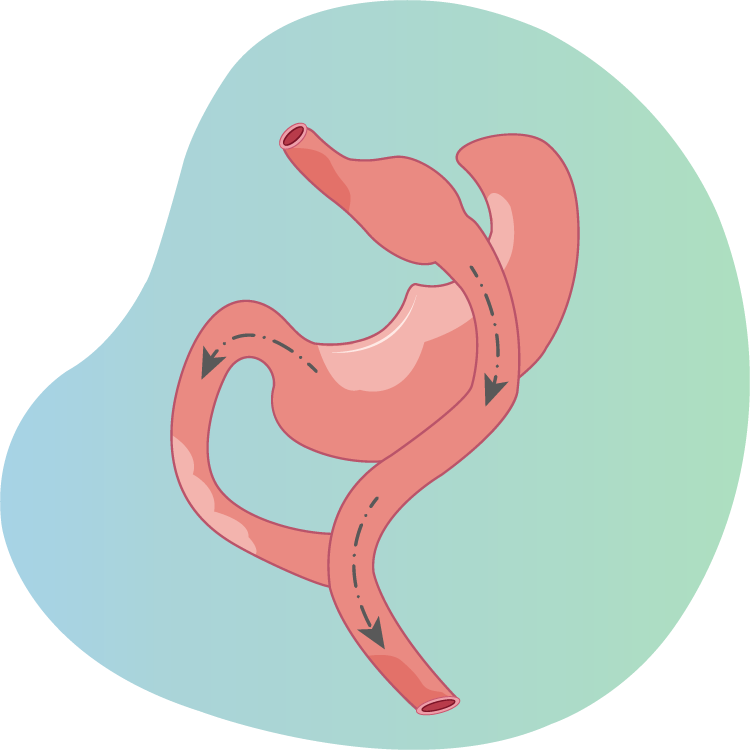Gastric Bypass Turkey – Costs: GetBeauty in Turkey offers cost-effective gastric bypass procedures for lasting weight loss. Our seasoned specialists deliver comprehensive treatments in our all-inclusive packages, covering consultation to recovery. Begin your weight loss journey with us and discover exceptional healthcare.
Gastric Bypass Turkey – Costs £2,890 or $3,590
Gastric bypass in Turkey offers an affordable solution to obesity. With GetBeauty Turkey, enjoy all-inclusive packages for gastric bypass surgery procedures at competitive prices.
30 – 60 Minutes
5 Days
From £2,890 or $3,590
Gastric bypass surgery is a popular and effective method in combating obesity, widely practiced in many countries including Turkey. This complex procedure offers significant benefits for weight loss.
During this surgical procedure, the surgeon reduces the size of the stomach to about 15-20 ml capacity. Next, the newly formed smaller stomach is connected directly to a loop of the small intestine located further down. This bypasses the duodenum and excludes it from digestion, hence the term “gastric bypass”.
The bypass technique ensures that food and digestive juices meet only in the mid-small intestine, thus reducing calorie intake, leading to effective and lasting weight loss.
Gastric bypass is particularly suited for individuals with a BMI over 35, or a BMI of 30 if additional health problems like diabetes, hypertension, or sleep apnea are present. It’s especially recommended for individuals struggling with obesity due to the excessive consumption of high-calorie foods. Long-term studies have proven the effectiveness of this operation, which helps lose about 65-70% of excess weight and reduce obesity-associated diseases.

A compelling advantage of undergoing gastric bypass surgery abroad, such as in Turkey, is the ability to largely retain natural digestive function without the need for a foreign body as in gastric band surgery. The operation restructures a small part of the stomach into a pouch and directly connects it with the small intestine, bypassing the rest of the stomach and part of the small intestine.
Gastric bypass surgery has proven to be an effective method for treating obesity and overweight conditions. It is particularly useful for patients with metabolic complications like diabetes.
GetBeauty Turkey in Antalya provides gastric bypass treatment with the support of a multidisciplinary medical team that works closely with patients throughout the process. This includes pre-examinations, performing the surgery itself, and subsequent follow-up and support during the weight reduction phase post-surgery.


The cost is a crucial factor when considering a gastric bypass operation. With GetBeauty Turkey, you have an option that offers high-quality medical care at affordable prices. Medical procedures in Turkey are often significantly lower in cost than in many Western countries, making gastric bypass surgery an attractive choice.
The cost for gastric bypass surgery at GetBeauty Turkey is a mere £2,890 or $3,590, a highly competitive price. These all-inclusive packages cover not only the operation but all pre- and post-operative examinations as well. The excellent quality of medical care combined with attractive costs makes GetBeauty Turkey a leading provider of gastric bypass surgery in Turkey and a popular destination for patients worldwide.
As with any surgical procedure, gastric bypass comes with certain risks and side effects, which are rare. These include possible postoperative bleeding, infections, thrombosis, or pulmonary embolism. There is also a minimal risk of leaks at the reduced stomach’s suture site. Long-term risks could include difficulties in nutrition, weight gain, or reflux diseases. Nonetheless, the operation is an established and safe surgical procedure for weight reduction. An extensive consultation and examination before the procedure are vital to ensure safe and successful treatment.
The risk of complications can be reduced by choosing a qualified and experienced surgical team and diligently following postoperative instructions. Thorough preparation and follow-up, as guaranteed by GetBeauty Turkey, are also crucial to minimize risks and ensure optimal recovery.

In our “Frequently Asked Questions (FAQ)” section, we address the most common queries about gastric bypass in Turkey. Here, you’ll receive detailed information about preparing for the procedure, the operation itself, subsequent follow-up care, and the associated risks. Our expert team at GetBeauty Turkey is ready to answer all your questions and give you a profound understanding of this weight-reducing procedure. Whether you’re curious about dietary guidelines post-surgery or wondering how the operation might affect your daily life, we have the answers for you.
Gastric Bypass and Sleeve Gastrectomy are both popular and effective surgical procedures for weight loss, but they are quite different in their approaches.
Both surgeries help in significant weight loss, but the rate and amount may vary.
Both surgeries can improve or even resolve conditions associated with obesity, such as type 2 diabetes, high blood pressure, sleep apnea, and others. Gastric bypass has shown a slightly better result in resolving type 2 diabetes compared to sleeve gastrectomy.
It’s important to note that both procedures require significant lifestyle changes for sustained weight loss, including diet modifications and regular physical activity. The choice between the two often depends on the patient’s specific health conditions, weight loss goals, and discussion with the healthcare provider.
Suitable candidates for gastric bypass surgery are generally individuals who:
Candidates should also be ready to commit to lifestyle changes for a healthier life post-surgery. This surgery isn’t suitable for individuals with severe liver disease, blood clotting disorders, severe heart disease, or untreated mental illnesses.
The costs for gastric bypass surgery at GetBeauty Turkey start from £3,290. This is an all-inclusive package price, which typically covers pre- and post-operative care, the surgical procedure itself, hospital stay, medications, and other necessary services. Please consult with GetBeauty Turkey for a detailed breakdown and any possible additional costs. The affordability, along with the high quality of healthcare services, makes GetBeauty Turkey a popular choice for patients worldwide.
Gastric Bypass Turkey Costs
At GetBeauty Turkey, the gastric bypass operation is performed under general anesthesia by a team of highly experienced surgeons. Here’s an overview of the procedure:
The process begins with an initial consultation to determine if you are a suitable candidate for the procedure. The surgeon will review your medical history and perform a physical examination. You may also need to undergo certain preoperative tests.
The gastric bypass procedure is typically performed laparoscopically, meaning it’s minimally invasive with small incisions. The surgeon reduces the size of the stomach to create a small pouch and connects it directly to the small intestine, bypassing a significant portion of the digestive tract.
Post-surgery, you’ll stay in the hospital for monitoring and recovery. The duration of the stay may vary depending on individual cases.
You will receive detailed post-operative instructions and a diet plan to follow. Regular follow-ups will be scheduled to monitor your health and progress.
The team at GetBeauty Turkey will be there to support and guide you throughout the entire process, ensuring a smooth and comfortable experience.
Gastric bypass surgery is typically considered a permanent procedure. While it technically can be reversed, reversal is usually reserved for patients experiencing serious complications or health issues, as the reversal procedure itself can be risky and complex. It’s important to remember that the primary goal of gastric bypass surgery is a long-term commitment to a healthier lifestyle.
The length of the hospital stay following a gastric bypass procedure can vary based on the patient’s individual circumstances and the specifics of the operation. However, at GetBeauty Turkey, patients are typically expected to stay in the hospital for 5 days post-operation. This allows the medical team to closely monitor the patient’s recovery, manage pain, and provide early intervention if any complications arise. Furthermore, during this period, patients receive instructions and guidance on diet and lifestyle changes needed post-surgery.
Eating too much after gastric bypass surgery can lead to a variety of uncomfortable and sometimes serious symptoms. This is due to a condition known as “dumping syndrome.” This occurs when food moves too quickly from the stomach into the small intestine, causing symptoms like nausea, vomiting, diarrhea, dizziness, and sweating.
In the long term, consistently overeating can stretch the stomach pouch and lead to weight regain. Additionally, overeating high-fat, high-sugar foods can lead to weight gain and potentially diminish the effectiveness of the surgery.
To avoid these complications, patients are advised to adhere strictly to the dietary guidelines provided by their healthcare team after surgery. This generally involves eating small, balanced meals, chewing food thoroughly, and avoiding foods that are high in sugar and fat.
It’s also essential to stay hydrated by drinking plenty of fluids, but to avoid drinking during meals as this can fill up the stomach pouch quickly.
Remember, the goal of gastric bypass surgery is to assist with long-term weight loss, and this requires a commitment to lifestyle and dietary changes. It’s important to follow all postoperative instructions carefully for the best results.
Gastric bypass can have a profound impact on Type 2 diabetes. Many people experience improvement or even remission of their diabetes symptoms following the surgery. This happens because gastric bypass surgery can improve the body’s ability to regulate blood sugar levels.
Several factors are at play here. First, weight loss itself can improve blood sugar control. Second, bypassing a portion of the small intestine changes hormones in the gut that may influence insulin production and sensitivity. The exact mechanisms are still being studied, but the results are promising.
It’s important to note that while gastric bypass surgery can significantly improve diabetes in many patients, it’s not a guaranteed cure and it’s still crucial to follow the guidance of a healthcare provider in managing diabetes.
Gastric bypass surgery is a major procedure and therefore has several prerequisites to ensure it’s safe and effective. These typically include:
Generally, gastric bypass surgery is considered for people with a body mass index (BMI) of 40 or more, or a BMI of 35 or more in conjunction with serious weight-related health problems, such as type 2 diabetes, heart disease, or severe sleep apnea.
Gastric bypass is typically considered when serious attempts to lose weight with diet and exercise have been unsuccessful.
Candidates must undergo a psychological evaluation to ensure they are mentally prepared for the surgery and the lifestyle changes required afterward.
A thorough medical evaluation is needed to check for any health conditions that could pose risks during the surgery.
Candidates must be willing and able to make permanent changes to their diet and lifestyle after surgery. This includes following specific dietary restrictions and committing to regular exercise.
Although age limits aren’t absolute, the risk associated with gastric bypass surgery increases for patients over the age of 65.
Each patient is unique, so the prerequisites can vary. It’s important to have a comprehensive discussion with the healthcare team to understand if gastric bypass surgery is the right option.
Choosing GetBeauty Turkey for gastric bypass surgery offers several advantages:
GetBeauty Turkey boasts a multidisciplinary medical team with vast experience in gastric bypass procedures, ensuring high-quality surgical care.
Affordable Pricing
With all-inclusive packages starting at just £3,290, you can access top-tier medical care at significantly lower costs than in many Western countries.
GetBeauty’s all-inclusive packages cover not just the surgery itself, but also pre- and post-operative care, including all necessary examinations.
The opportunity to recover in beautiful Antalya, Turkey, can also make the whole experience more pleasant and less stressful.
The combination of affordable pricing, high-quality healthcare, and comprehensive services makes GetBeauty Turkey a preferred choice for many patients seeking gastric bypass surgery.
BMI, or Body Mass Index, is a numerical value derived from an individual’s weight and height. It is defined as the individual’s body mass divided by the square of their height. The formula for calculating BMI is:
BMI = weight (kg) / [height (m)]^2
BMI = [weight (lbs) / [height (in)]^2] * 703
The “703” in the second formula is to convert the index from the original metric version of the formula to the English (Imperial) version.
BMI is commonly used to quickly and simply identify whether a person has a healthy body weight for a given height. It is used to screen for weight categories that may lead to health problems.
While BMI can be a useful tool for identifying those who are underweight, normal weight, overweight, or obese, it is not a diagnostic tool. It does not account for factors like muscle mass, bone density, overall body composition, and racial and sex differences. Hence, it’s important to consider other factors and tests when evaluating one’s overall health and fitness.
+90 542 660 86 00
+90 542 660 86 00
contact@getbeautyturkey.com